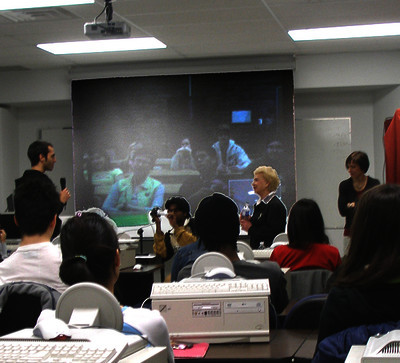Preparing for a Hybrid Course to Better Serve ‘Gestion de commerces’ Students of Varying English Skills
For several years now there has been an ESP (English for specific purposes) course offered as part of the program for students in the profile ‘Gestion de commerces.’ At Cégep du Vieux Montréal this course is identified as 604-410-VM English in Business.
During the course’s development in 2003 at CVM, a major problem was identified by members of the Département de Langues – there weren’t enough students in the program to create more than one group. The class would therefore contain students whose language skills varied from level 101 to 103, a range of competence from beginner to bilingual. No other English course at Vieux Montreal is as diverse in terms of skill levels, and over the years, no teacher in the department has completely overcome the difficulties that such a mix entails.

Joy’s Inspirationnal blog.
Once again, in Winter 2011 I was assigned this course. While on Profweb’s Personal Space, I noticed a blog for the business ESP course offered at Granby by Joy Blake. It occurred to me that a way to deal with the mixed level structure of this course could be achieved by using information technology. An arrangement similar to the joint humanities classes offered at Vanier and Sept-Îles could be created. Two or more teachers could divide their combined virtual class into two or more groups according to language levels.
After reading the story by Helen Stavaris, I also felt that a hybrid course consisting of face-to-face time with the mixed level group in each college complemented by virtual encounters among similar level students in all participating colleges would be the most effective solution. I applied for funding from the Entente Quebec Canada to have the release time to make these classes a reality.

Explore the online resources for this course!
Much of the material I have used this year was developed with an eye to incorporating it into a possible hybrid course, so I was pleased to receive the green light from the CQE allowing me to proceed with my experiment.
- Guest Visitors: What better way to discuss business in English than to invite Anglophone businesspeople into the classroom! Being based in Montreal, contacting guest speakers was quite easy, and their enthusiasm was an asset to my teaching. This year we had an ice cream manufacturer, a plumber, and an advertising developer from a large marketing firm. Left to come is a producer of documentary films. These visits can easily be broadcast to other schools using a webcam and a Skype connection. I saw the possibilities for this kind of connection in the article about the joint humanities classes being run by Vanier and Cégep de Sept Îles.

The ‘Fenêtre de Téléprésence’ used in the Vanier-Sept-Îles program is a great way to allow virtual students to participate in guest presentations.
- Recording Group Conversations: After each guest visit, students were asked to discuss the visit in permanent groups. This made up a significant part of their grade as one of the course’s major goals is oral conversation. The groups were arranged so that students with varying skills in English worked together. More advanced students were expected to help less advanced students gain expertise in speaking. Recording conversations with multiple groups is a great way to give students conversational practice without engendering stage fright. Making these recordings in our language lab meant that students didn’t have to face an audience, and the teacher could review the mp3 file to target errors and more precisely attribute a grade. Next year these conversations can be extended between different schools using Skype and shareware like the mp3 Skype recorder
- Student Grammar Presentations: This year students made grammar presentations. Finding grammar issues that were relevant in a group with such varied skills was challenging although I found fertile ground in Jane Petring’s book Access which was designed to accompany a program-oriented course. I used clickers in my first few courses and all student presentations took advantage of this technology to maintain student involvement and interest.
- Online Grammar Tests: Once again I used Netquiz to create online grammar tests. Housing the tests on my Profweb Personal Space, I knew they would be available to students in a number of schools. The architecture of Netquiz which creates exams from a bank of questions allowed me to create multiple tests easily to address the various skill levels of my students.
- Modular Course Organization: The course was divided into four three-week theme based modules. Each module had a thematic presentation by a team and ended with a visit by a local business man. The thematic teams stayed together for discussions of all visits. I felt that this modular architecture would make the course more understandable and give both teachers and students alike a chance to improve their performances through repetition.
- Scaffolded Writing Tasks: Although I didn’t begin with a scaffolded writing assignment, I realized that I had created one when I participated in the APOP Net Talk for Humanities on Revision Strategies which was given on April 8. Students were asked to write the Introduction to their Final Case Study for Week 7. It will be incorporated into their final work. I found that this strategy allowed students to better understand what I wanted from them and to better develop their ability to write in teams.
- Team Document Creation: As a Profweb editor I have been working with Janos Varga on a new soon-to-be-released report on Cloud-based Blended Synchronous/Asynchronous Shared Documents. My students have been producing their case studies in teams using Google Docs. I switched several groups to Typewwith.me as a result of what I had learned from the report. This kind of joint document production is ideal for students in hybrid courses writing together from several locations.
There is funding for one course of release time for each teacher participating in this project. If you teach English in Business and would like to participate in giving this type of course, please contact me or leave a message in the comments feature below.


